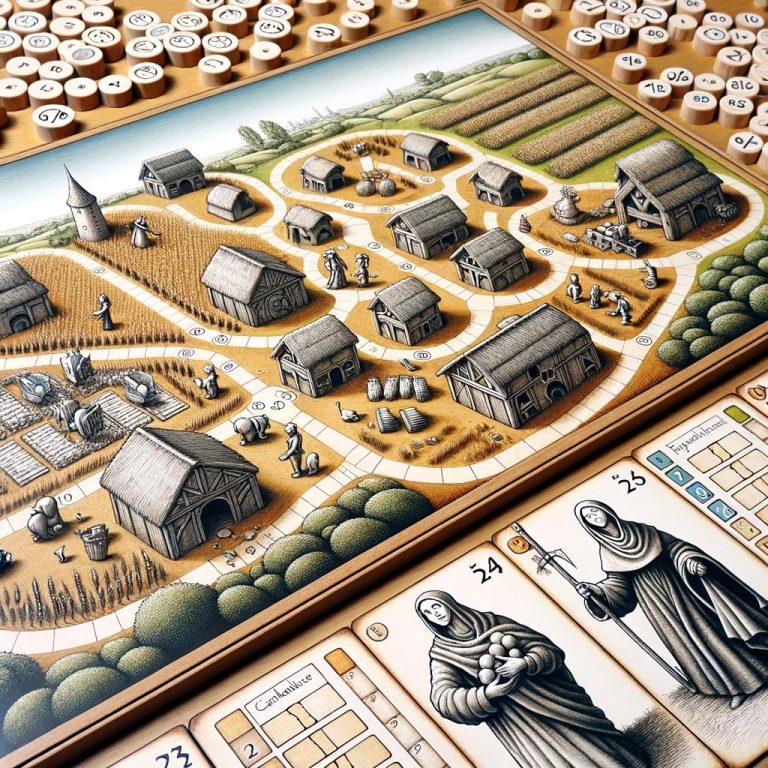For enthusiasts of the Agricola board game seeking to improve their gameplay, understanding effective strategies is crucial. Whether you’re a beginner looking to enhance your skills or a seasoned player aiming to achieve victory consistently, implementing the right tactics can make all the difference.
In this article, we will delve into the intricacies of Agricola strategy, focusing on key elements such as resource management, building a productive farm, and outmaneuvering opponents. From setting up in the initial rounds to planning for long-term success, mastering these strategies will elevate your gameplay experience.
To excel in the world of Agricola, it’s essential to grasp the basics of the game first. Understanding the mechanics of acquiring resources, expanding your farm, and fulfilling various requirements is fundamental. As you dive deeper into developing your strategic approach, factors like improving efficiency in actions, maximizing point-scoring opportunities, and adapting to different player counts will become pivotal. By incorporating these fundamental concepts into your gameplay, you can lay a strong foundation for success in Agricola.
In this guide, we will explore how to set yourself up for victory by making strategic decisions early on in the game. From selecting starting resources and occupations to planning your layout effectively, every move in Agricola can influence your prospects of winning.
By optimizing your initial steps and focusing on key components such as food production and resource diversity, you can establish a solid groundwork for implementing more advanced strategies later on. Stay tuned as we unveil expert tips and tricks for enhancing your Agricola gameplay and staying ahead of the competition.
Understanding the Basics of Agricola
Agricola Overview
Agricola is a popular board game that involves players becoming farmers and managing their own farms. The game revolves around resource management, worker placement, and strategic decision-making. Each player starts with a small farm plot and a few basic resources, aiming to grow their farm, raise animals, improve their home, and feed their family while competing against others for limited resources.
Resource Management
One of the key aspects of Agricola is resource management. Players must carefully allocate their resources such as wood, clay, reed, stone, and food to build structures on their farm, cultivate fields, and acquire livestock. Balancing the need for immediate resources with long-term goals is crucial to success in the game. Additionally, players must pay attention to the ever-shrinking pool of resources available as the game progresses.
Worker Placement
Another important element of Agricola is worker placement. Players take turns placing their family members on various action spaces on the game board to perform tasks such as plowing fields, sowing crops, renovating structures, or acquiring new resources. Strategic placement of workers is key to optimizing efficiency and maximizing productivity on the farm. Understanding which actions are essential at different stages of the game can give players a competitive edge in Agricola.
By mastering the basics of resource management and worker placement in Agricola, players can lay a solid foundation for developing effective strategies throughout the game. Understanding how these core mechanics work together will be essential for aspiring farmers looking to achieve victory in this challenging board game.
Setting Up for Success
In the game of Agricola, setting up for success begins with understanding the basic mechanics and objectives of the game. One key aspect to focus on in the initial phases of Agricola is resource management. Players must carefully balance their resources to ensure they have enough food to feed their family members each round, while also acquiring and improving their farm to score points. This requires both short-term planning and long-term strategy.
One important initial step in Agricola Board Game Strategy is prioritizing your actions based on your current needs and goals. In the early rounds, it is crucial to secure a steady source of food production, whether through farming or animal husbandry. Additionally, players should consider investing in improvements that will provide ongoing benefits throughout the game. This could include acquiring tools to enhance efficiency or building rooms to accommodate more family members.
Another key aspect of setting up for success in Agricola is ensuring a diverse range of actions each round. By spreading out your efforts across different areas such as plowing fields, sowing crops, and raising animals, players can maximize their chances of scoring points and fulfilling requirements for end-game bonuses.
Flexibility and adaptability are also essential in responding to changing circumstances or opponent strategies, making sure that you can pivot your plans if needed to stay competitive throughout the game.
Key Components of a Winning Agricola Strategy
When it comes to devising a winning strategy for the Agricola board game, there are several key components that players must consider in order to come out on top. These components encompass various aspects of the game, from resource management to family growth and occupation selection. By understanding and mastering these key components, players can increase their chances of success in this competitive farming simulation game.
One crucial aspect of a winning Agricola strategy is efficient resource management. Players must carefully balance their resources, such as wood, clay, reed, and stone, to ensure they can build necessary structures and feed their growing family. This often involves planning ahead and making strategic decisions about which resources to acquire early on in the game. Utilizing action spaces that allow for resource accumulation can be beneficial in securing a steady supply throughout the gameplay.
Additionally, family growth is a fundamental component of Agricola strategy that cannot be overlooked. Increasing the size of one’s family allows for more actions per round, providing a significant advantage over opponents with smaller families. Players should prioritize early family growth by taking actions that enable them to expand their household efficiently.
Choosing strong occupations and improvements that support family growth can also aid in establishing a solid foundation for future turns. By focusing on both resource management and family growth, players can build a well-rounded strategy that positions them for success in Agricola.
In addition to resource management and family growth, occupation selection plays a vital role in shaping a player’s strategy in Agricola. Occupations provide unique abilities and opportunities that can give players an edge over their opponents. It is essential for players to consider how their chosen occupations complement their overall gameplay style and goals.
Additionally, selecting occupations that synergize well with each other can create powerful combinations that enhance one’s strategic capabilities. By carefully choosing occupations that align with their long-term objectives and adapting their strategy based on the changing dynamics of the game, players can optimize their chances of victory in Agricola.
Planning Ahead
In the game of Agricola, long-term planning is crucial to secure victory over your opponents. As you progress through each round, it’s important to have a clear strategy in mind that will help you build a successful farm and acquire the resources needed to thrive. In this section, we will delve into some key aspects of long-term planning in Agricola and how you can effectively strategize for success.
Building a Diverse Farm
One of the fundamental elements of a successful long-term strategy in Agricola is building a diverse and well-rounded farm. This means focusing on not just one aspect of the game, such as livestock or crops, but rather ensuring that you have a balance of different types of resources.
By diversifying your farm, you can mitigate risks and adapt to changing circumstances throughout the game. Consider investing in a mix of fields, pastures, animals, and infrastructure to create a resilient and efficient agricultural operation.
Securing Sustainable Growth
Another key component of long-term planning in Agricola is securing sustainable growth for your farm. This involves not only expanding your operations but also ensuring that you have enough food production to support your family members and grow your workforce.
Be strategic about when and how you expand your farm, making sure to prioritize actions that will generate resources for future rounds. By maintaining a balance between growth and sustainability, you can set yourself up for success in the later stages of the game.
Adapting to Changing Conditions
A critical aspect of long-term strategy in Agricola is the ability to adapt to changing conditions and unforeseen events. As the game progresses, new opportunities and challenges will arise that require flexibility and quick decision-making. Stay vigilant and be prepared to modify your original plans based on what unfolds during each round. Whether it’s adjusting resource priorities or seizing unexpected opportunities, being adaptable is essential for navigating the complexities of Agricola board game strategy.
Adapting to Different Player Counts in Agricola
Adapting your strategy based on the number of players in a game of Agricola is crucial for success. With different player counts, the dynamics of the game change significantly, requiring you to adjust your approach accordingly. Understanding how player count affects gameplay and adapting your strategies can give you a competitive edge.
In a two-player game of Agricola, competition for resources may not be as intense compared to a higher player count. This means you can focus more on building up your own farm and maximizing your actions without as much interference from opponents. However, in a four or five-player game, resources will be scarce, and competition will be fierce. You’ll need to plan your moves carefully and be prepared to adapt quickly to changing circumstances.
One key aspect to consider when adapting your strategy to different player counts is the Occupation and Minor Improvement cards. In games with fewer players, certain cards that rely on interaction with opponents may not be as effective. On the other hand, in larger games, these cards could provide valuable benefits if used strategically. Understanding the synergies between cards and adjusting your strategy based on the number of players can greatly impact your chances of success in Agricola.
| Player Count | Strategy Consideration |
|---|---|
| 2 Players | Focus on building up your own farm with less competition for resources. |
| 4-5 Players | Plan moves carefully and be prepared for intense competition for scarce resources. |
| All Player Counts | Adjust strategy based on Occupation and Minor Improvement cards interactions. |
Common Mistakes to Avoid in Agricola Board Game Strategy
When diving into the world of Agricola, it’s crucial to be aware of common pitfalls that can derail your strategy and lead to defeat. One of the most frequent mistakes players make is neglecting to secure food for their family members early on in the game. Without a steady food source, you risk accumulating hefty penalties that can hinder your progress. To avoid this, prioritize actions that allow you to gather or produce food consistently throughout each round.
Another common mistake in Agricola is overextending your resources too quickly. While it may be tempting to expand your farm rapidly, doing so without a solid foundation can leave you struggling to maintain your operations. Instead, focus on building up essential structures and securing key resources before branching out. This approach will ensure a more stable and sustainable development path for your farm.
Lastly, one key misstep to steer clear of in Agricola is fixating on a single strategy without remaining flexible. The game’s dynamic nature and interactions with other players necessitate adaptability and the ability to pivot when necessary. By being open to shifting tactics based on changing circumstances or opponents’ moves, you’ll increase your chances of success and outmaneuver competitors.
| Common Mistakes | How to Avoid |
|---|---|
| Neglecting food production | Prioritize gathering or producing food early on |
| Overextending resources too quickly | Focus on building essential structures first before expanding |
| Fixating on a single strategy | Remain flexible and adaptable to changing circumstances |
Advanced Tips and Tricks for Mastering Agricola Strategy
Mastering the Agricola board game strategy requires a deep understanding of the game mechanics and optimal decision-making. In this section, we will delve into some advanced tips and tricks to help elevate your gameplay and increase your chances of success in this beloved farming game.
One key aspect of advanced Agricola strategy is resource management. As the game progresses, it becomes crucial to efficiently use your resources to expand your farm, feed your family, and ultimately score points. This means prioritizing actions that will yield the most resources while also being mindful of potential future needs. Planning several steps ahead and anticipating potential obstacles can give you a significant advantage over your opponents.
Another important element of mastering Agricola strategy is flexibility. While having a long-term plan is essential, it is equally important to adapt to changing circumstances during the game. Being able to pivot quickly in response to new opportunities or challenges can often make the difference between victory and defeat. Stay open-minded and be willing to adjust your strategy based on what unfolds during the course of play.
Additionally, don’t underestimate the power of card synergies in Agricola. Combining cards with complementary effects can create powerful combos that propel you ahead of your rivals. Take the time to study the cards available in each round and look for opportunities to build a cohesive engine that maximizes your efficiency and point-scoring potential. By cleverly leveraging card synergies, you can gain a strategic edge that sets you on the path to victory in Agricola.
Conclusion
In conclusion, mastering Agricola board game strategy requires a combination of foresight, adaptability, and careful planning. By understanding the basics of the game, setting up for success from the outset, and implementing key components of a winning strategy, players can increase their chances of victory. It is essential to plan ahead and consider long-term strategies that will help secure the necessary resources and points to outshine opponents.
Adapting to different player counts in Agricola is also crucial in developing a successful strategy. Players must be able to adjust their tactics based on the number of players at the table, as this can significantly impact gameplay dynamics. By avoiding common mistakes and implementing advanced tips and tricks, players can further enhance their gameplay experience and improve their overall performance in Agricola.
Ultimately, success in Agricola hinges on a player’s ability to combine all aspects of strategy effectively. By putting it all together – understanding the game mechanics, planning ahead, adapting to different situations, and avoiding pitfalls – players can increase their chances of claiming victory in this challenging board game. With practice and strategic thinking, anyone can become a master of Agricola strategy and enjoy the thrill of outmaneuvering opponents to emerge victorious.
Frequently Asked Questions
What Is the Best Farm Layout for Agricola?
The best farm layout for Agricola will depend on your specific strategy and the cards you draw during the game. It’s important to balance your resources, expand your family, and focus on scoring points efficiently.
How Long Does It Take to Play Agricola?
The average playtime for Agricola can vary depending on the number of players and their experience level. Generally, a game with 2 players can take around 30-45 minutes, while a game with 4 players may last around 60-90 minutes.
Is Agricola Similar to Catan?
Agricola and Catan are both popular strategy board games, but they have different mechanics and themes. While both games involve resource management and strategic planning, Agricola focuses more on building a successful farm while Catan revolves around trading and settlement building on an island.

I love playing all kinds of games – from classics like Monopoly to modern favourites like Ticket to Ride.
I created this blog as a way to share my love of board games with others, and provide information on the latest releases and news in the industry.





